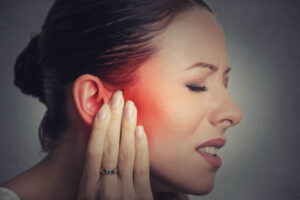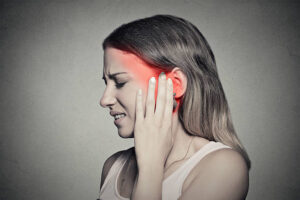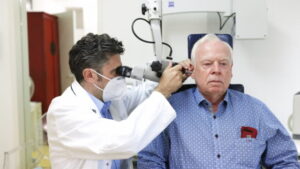Ear pain when swallowing is a common yet distressing condition that affects people of all ages. This discomfort can range from a mild annoyance to severe pain, significantly impacting the quality of life of those affected. In this comprehensive article, we aim to delve into the causes, symptoms, treatments, and preventive measures for ear pain when swallowing, providing readers with the knowledge they need to understand and address this condition.
Table of Contents
ToggleUnderstanding Ear Pain When Swallowing
Have You Had Ear Pain When Swallowing?

Ear pain when swallowing is a symptom that occurs due to discomfort or pain in the ear canal or middle ear that is particularly noticeable when swallowing. This condition has medical relevance as it often indicates underlying infections or mechanical issues within the ear, throat, or nasal passages.
Why Does My Ear Hurt When I Swallow?
The act of swallowing can cause ear pain due to the physiological process involving the Eustachian tube, a canal that links the middle ear to the throat and the back of the nasal cavity. Its primary role is to equalize the pressure in the middle ear, ensuring it matches the air pressure outside the body. When this tube is blocked or inflamed, it can lead to pressure changes that manifest as ear pain when swallowing.
Common Causes of Ear Pain When Swallowing
1.Infections Leading to Ear Pain
- Ear Infections:
- Otitis Externa (Outer Ear Infection): Characterized by inflammation and pain in the outer ear canal.
- Otitis Media (Middle Ear Infection): Involves fluid buildup and infection in the middle ear, often causing significant pain and hearing issues.
- Throat Infections:
- Conditions like tonsillitis and pharyngitis can cause referred pain to the ear due to the close proximity of throat structures to the ear canal.
- Sinus Infections:
- Sinusitis can lead to ear pain when swallowing because of the interconnectedness of sinus and ear pressure systems.
2.Non-Infectious Causes
- Eustachian Tube Dysfunction: Inability of the Eustachian tube to properly open and close can lead to a feeling of fullness, pressure, and ear pain when swallowing.
- TMJ Disorders: Problems with the temporomandibular joint (TMJ) can cause pain to radiate to the ear, especially noticeable when moving the jaw, such as during swallowing.
- Allergies: Allergic reactions can cause inflammation and swelling in the nasal passages and throat, impacting Eustachian tube function and leading to ear pain.
- Gastroesophageal Reflux Disease (GERD): Acid reflux can irritate the throat and Eustachian tube openings, causing discomfort and ear pain when swallowing.
3.Other Potential Causes
- Foreign Objects: Small objects stuck in the ear canal can cause pain and discomfort.
- Earwax Buildup: Excessive earwax can block the ear canal, leading to pain and hearing loss.
- Eagle Syndrome: A rare condition where elongated styloid process or calcified stylohyoid ligament causes throat and ear pain.
Symptoms Accompanying Ear Pain When Swallowing
Recognizing the symptoms that often accompany ear pain when swallowing can help differentiate between the various underlying causes. These symptoms include:
- Hearing Loss
- Dizziness
- Fever
- Sore Throat
- Sinus Pressure
- Headache
- Discharge from the Ear
- Difficulty Swallowing
Differentiating these symptoms based on their underlying cause is essential for accurate diagnosis and treatment. For instance, ear infections might lead to fever and discharge from the ear, while Eustachian tube dysfunction might cause a feeling of fullness and hearing changes without fever.
Diagnosing Ear Pain When Swallowing

The diagnostic process for ear pain when swallowing involves a comprehensive examination by a healthcare professional and may include various tests to determine the underlying cause. The steps typically include:
- Physical Examination
- Medical History Review
- Audiometry Test
- Tympanometry
- Endoscopy
These diagnostic steps are crucial in identifying the exact cause of ear pain and determining the most effective treatment plan.
Treating Ear Pain
Medical Treatments
Effective management of ear pain when swallowing often requires medical intervention, especially if the pain is due to infections or other health conditions. Common treatments include:
- Antibiotics
- Pain Relievers
- Decongestants and Antihistamines
Home Remedies and Lifestyle Changes
In addition to medical treatments, certain home remedies and lifestyle adjustments can support recovery and ease discomfort:
- Warm Compresses
- Hydration
- Dietary Adjustments
When Surgery is an Option
Surgical interventions may be considered in severe or chronic cases, such as:
- Tympanostomy Tubes
- Endoscopic Sinus Surgery
Selecting the appropriate treatment for ear pain when swallowing depends on the underlying cause, symptom severity, and the individual’s overall health status. Consulting with a healthcare professional is vital to establish the best course of action.
Prevention Tips for Ear Pain When Swallowing
To reduce the risk of developing ear pain when swallowing, consider implementing the following preventative measures:
- Maintain Good Ear and Dental Hygiene
- Stay Hydrated
- Avoid Allergens
- Practice Healthy Eating
- Quit Smoking
- Use Humidifiers
- Get Vaccinated
Following these tips can not only help prevent ear pain when swallowing but also contribute to overall ear and throat health.
When to See a Doctor

Identifying when to seek professional medical advice is crucial for effectively managing ear pain when swallowing. Consider making an appointment with a healthcare provider if you experience:
- Persistent or Severe Pain
- Accompanying Symptoms
- Difficulty Swallowing or Breathing
- Signs of Infection
Early intervention can prevent complications and ensure timely and effective treatment of the underlying cause of ear pain when swallowing.
SEE ALSO:
- 6 Surprising Benefits of Ginseng Tea: Unveil the Power Brew
- Tinea Pedis Medication: Your Ultimate Guide to Fighting Athlete’s Foot
- Understanding the 7 Levels of Lymph Nodes in the Neck: A Comprehensive Guide
- The L612 Pill (Loratadine 10 mg): Essential Insights for Effective Allergy Relief
